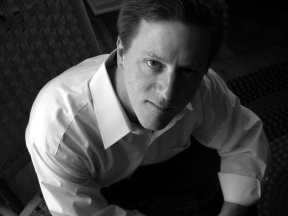J.C. Hallman has gone adventuring again, this time ...
In Utopia
On a beautiful summer evening during our recent trip to Minnesota, we caught up with author J.C. Hallman in St. Paul for dinner on the patio at W.A. Frost's.
Accompanying him was his significant other, Catherine Michele Adams. Catherine is a wonderful photographer, by the way, with a website you can visit
here.
It was great fun to meet and talk with both of them in person.
I have interviewed J.C. (Chris) Hallman twice over the past several years for Bookthink, in
March 2007 and again in
May 2009 . Hallman's latest book is
In Utopia: Six Kinds of Eden and the Search for a Better Paradise (St. Martin's Press, August 2010), in which he explores the history and literature of mankind's
attempts to create ideal societies, interlaced with his own visits to six modern- day utopian communities in locations as diverse as the United States, Europe and the
Far East - and a even community based on a ship. Hallman's infinite curiosity and playful yet insightful writing style make this book a fascinating read. He will be
on a promotional tour during late summer and early fall, so
here is your chance to meet him at one of these locations:

BOOKTHINK: In all your non-fiction books, I admire your ability to "join in the game," so to speak, and to approach different lifestyles with questions and thoughtful observation without being judgmental. You seem to have a capacity for being able to blend in and become a shrewd observer on all your adventures. To what do you owe that ability?
HALLMAN: I think it goes back to William James's book, that James made this impassioned argument that you can't understand religion by standing outside of it; rather that you have to get inside and participate with it. I immediately made the connection to George Plimpton's participatory journalism, and I think I blended those two things into a kind of personal mission statement. You know, Plimpton could have easily approached football, hockey or baseball or anything else he wrote about with a bemused distant view of the thing; he seemed to decide that in order to understand something, you have to strive to become it, and I certainly did that in writing about chess and in writing about William James.
BOOKTHINK: You grew up in California in a house built on "Utopia Road," but surely it was more than this street name that caused you to set out on this adventurous exploration of the utopian idea. What else motivated you to explore this subject?
HALLMAN: The utopia book is peculiar because for me, it has a kind of quality of the Odyssey: It's a journey home. The last section of the book is called "A Home" because it ultimately leads back to where I grew up. For me, it's not just participation in something other than myself but really recognizing that even though the place where I grew up had long since turned dystopian, there was a utopian heritage that I was investigating. The book is weirdly genealogical in that it investigates this idea that had an influence on the person I became long before I ever understood it was an idea. For a long time, Utopia Road was just a street sign where I grew up. Eventually I realized there was a heritage here.
BOOKTHINK: And is that what we are all seeking deep down - a home, a return to that Garden of Eden or that mythical place where everything's fair and everyone is happy?
HALLMAN: Utopian thought can be defined in lots of different ways, but for the purpose of the book, I wanted to take Martin Buber's description, and I'm quoting partially here: "It has been justly said that in a positive sense, every planning intellect is utopian." So for me, utopian thought was the planning intellect. That distinguishes it from a drive toward Eden, which is really an attempt to return to a previous time when things used to be perfect before they got screwed up. Whereas, utopian thought as the planning intellect is the idea that things have gotten screwed up, but we can fix it by moving forward and making progress in a more intelligent way. That was the operating definition that I was using in the book.


